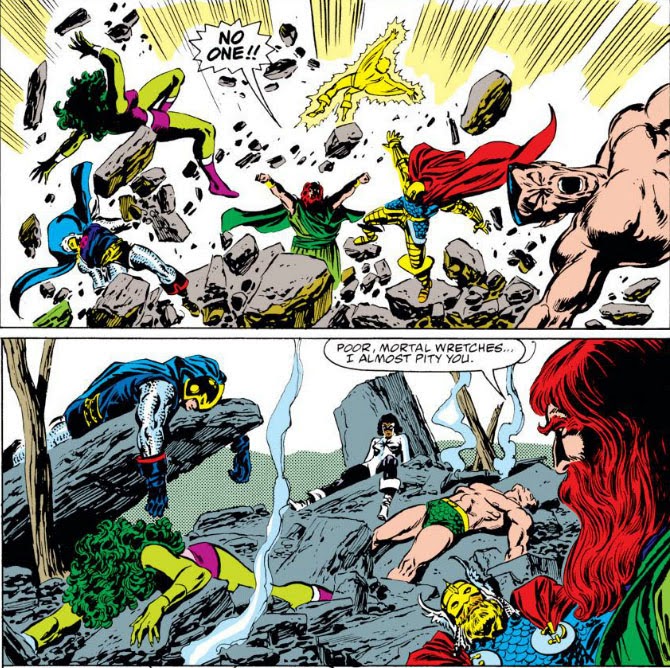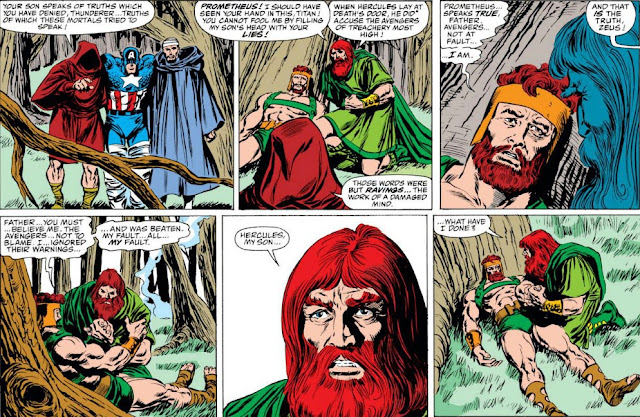Here's where we left things in Part One of the battle royal between the Avengers and Zeus, Lord of Olympus:
Thor, the Asgardian God of Thunder, has carried the bulk of the fight, with an enraged Zeus pulling no punches and showing no mercy in his brutal treatment of the son of Odin. Captain Marvel then joined the fight, giving Thor a breather and delivering an all-out strike against Zeus, with no apparent effect (if Zeus was to be believed). When the She-Hulk and the Sub-Mariner joined the fray, they, too, were dealt with savagely. Yet Zeus didn't deliver the killing blow to any of them, since he had promised that they would suffer a "death by torment" sentence for their alleged mistreatment of his son, Hercules--a charge the Avengers knew to be in error, but they were unable to get Zeus to cease hostilities long enough to listen to reason.
So our wrap-up issue has the Avengers still on their feet in a shaky stand-off with this thunder-lord who has been adamant in making the Avengers answer to his brand of justice.
But here's the odd thing. Given the momentum that has been building for the last few issues and leading up to this confrontation, and since the Avengers are likely to fight to the end, and it's a safe bet that Zeus certainly isn't going to back down, we can expect an escalation of hostilities right out of the "starting gate" of the issue, no? So doesn't this splash page seem completely out of sync?
I mean, it would make a decent Black Knight poster (if the shield were air-brushed out), and it might make sense if this comic were called "The Black Knight" instead of "The Avengers"--but this page just brings the momentum of the last few issues to a screeching halt. Why not have him facing off with Zeus first-thing? He's there to take him on anyway, right? But given how we left the Avengers the last time, it would make more sense dramatically to show the scene with Thor, Captain Marvel, and Zeus as the issue's splash page and deal in the Black Knight afterward. In fact, when the Knight does enter the battle, all of the characterization narrative on the splash page seems superfluous.
The Knight's attack jump-starts the battle again, with the downed Avengers leaping once more to the attack:
Yet, as mentioned last time, the fact that the Avengers are fighting a defensive (if aggressive) battle puts them at a disadvantage against a foe that will not hesitate to seize the opening of a pause in hostilities. And matters are made worse when the She-Hulk's lousy timing has her spoiling for a fight just as Captain Marvel is perhaps making headway with Zeus, a slight which Zeus's pride can't help but take as yet another show of insolence from these mortals.
Game, set, and match. And Zeus seems little the worse for wear.
But in taking his victory lap, Zeus finds yet another opponent attempting to inferfere with his plans for the Avengers.
With this new foe--seemingly another Avenger--Zeus is pushed past his breaking point, and all he sees now is red. His only goal now is to make absolutely clear to anyone within hearing range that his will is not to be defied under any circumstances, and he uses this challenger to set a brutal example.
Fortunately, it's the justice of the Avengers that prevails, fighting on for the truth that eludes only the crazed Zeus:
For behind the scenes, the other Avengers and their Olympian allies have been desperately working to calm the injured Hercules and begin to repair his damaged mind. And Zeus, to his horror, finds that it's been his own son who's been the target of his rage. And with Hercules now able to give some semblance of the facts as to what truly befell him while he was with the Avengers, his words finally bring Zeus back to his senses.
The ending to this story is somewhat bittersweet, and yet I see it as one of the Avengers' most impressive victories. In fighting for their lives, they also fought for their fellow Avenger and friend, as well as their own honor. And writer Roger Stern handled them brilliantly. They approached the situation as a team; Captain Marvel proved her ability to lead them was beyond reproach; they overcame setbacks, including serious injuries; and they tenaciously fought against the odds in order to reveal the truth. Yet no one was really in the mood to throw confetti, with Hercules needing to remain in Olympus and Thor having to depart in order to deal with the curse on his body that Hela had inflicted on him. The Sub-Mariner was also to discover that his group of undersea subjects had abandoned him in fear when he was captured and taken to Olympus.
Nor did Zeus come out of this unscathed, reaching a dramatic decision which didn't sit at all well with some of his subjects.
So it was a story that didn't exactly result in a resounding "Avengers Assemble!" at its end, but left no doubt that the Avengers assembled impressively for this adventure and acquitted themselves with distinction. It's a five-issue tale (collected in an 8-issue hardcover) that would rest nicely on your bookshelf.














2 comments:
Yes, that bittersweet ending was really well-done, and it makes this entire story a really satisfying read. Again, like I said in my last comment, it's a great book-end to Stern's run on Avengers, but it also makes me regret that he didn't continue on the book...
how much does the wrath of zeus cost I want to know this because I have it in mint condition still in packaging
Post a Comment